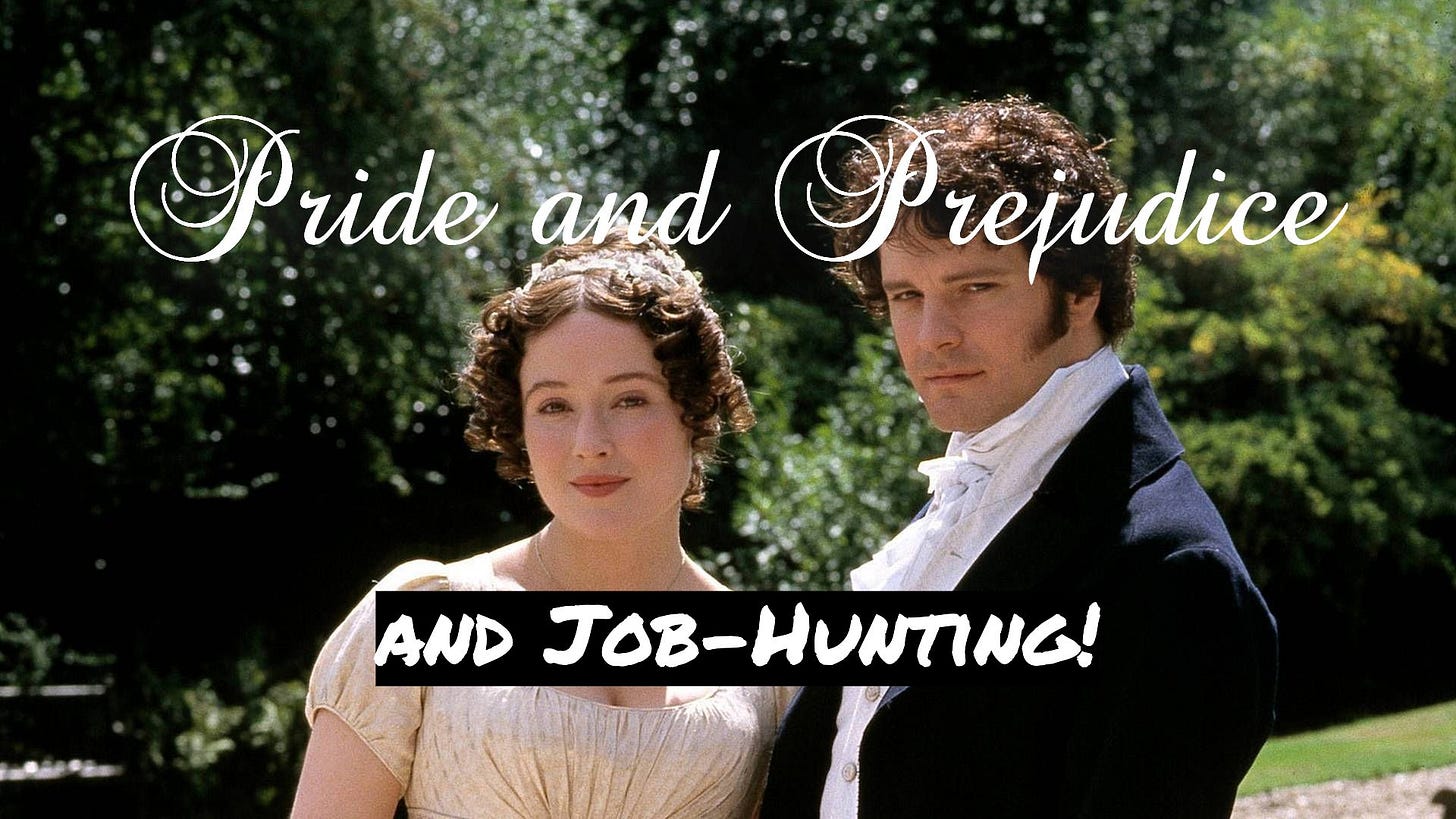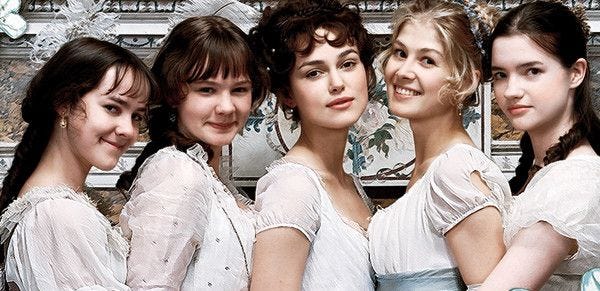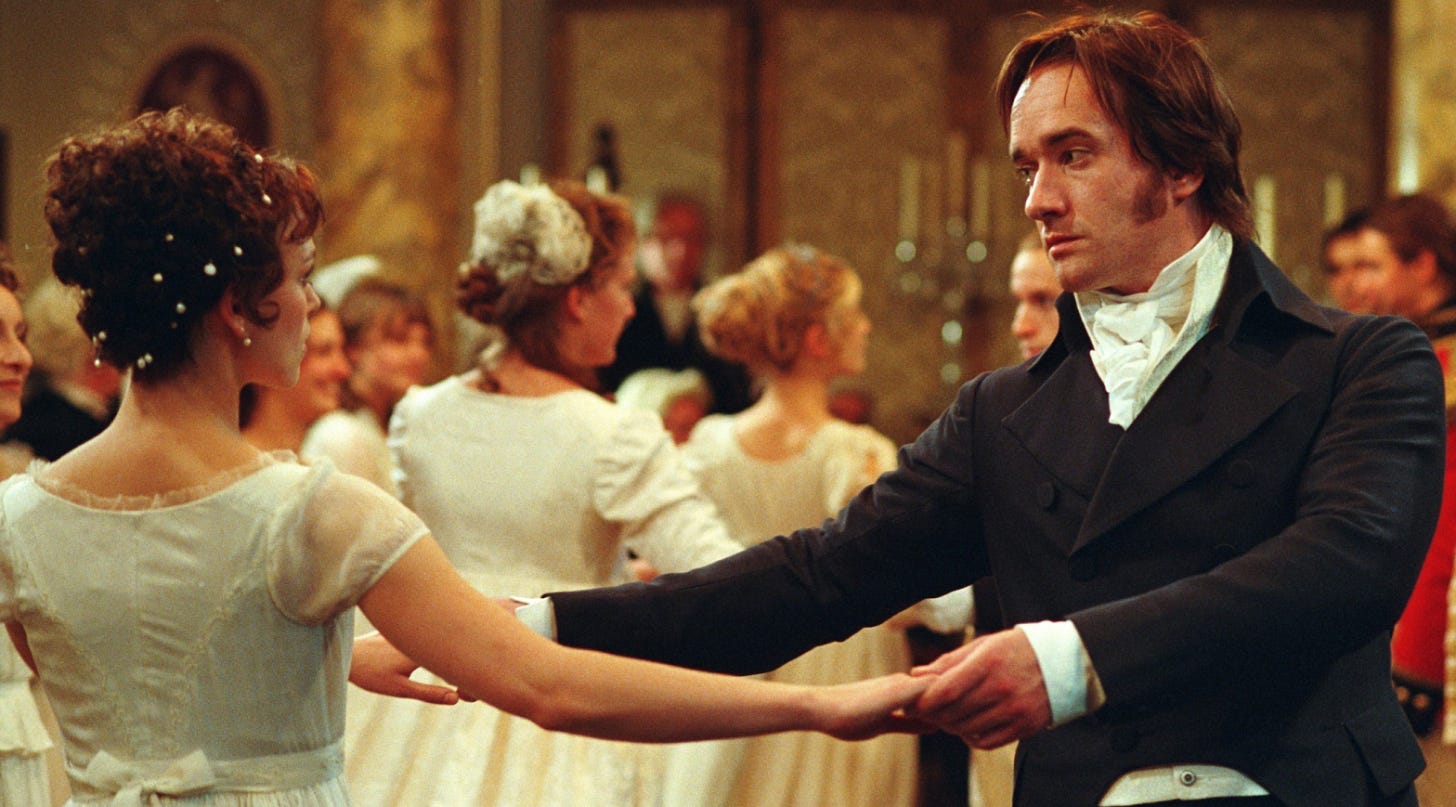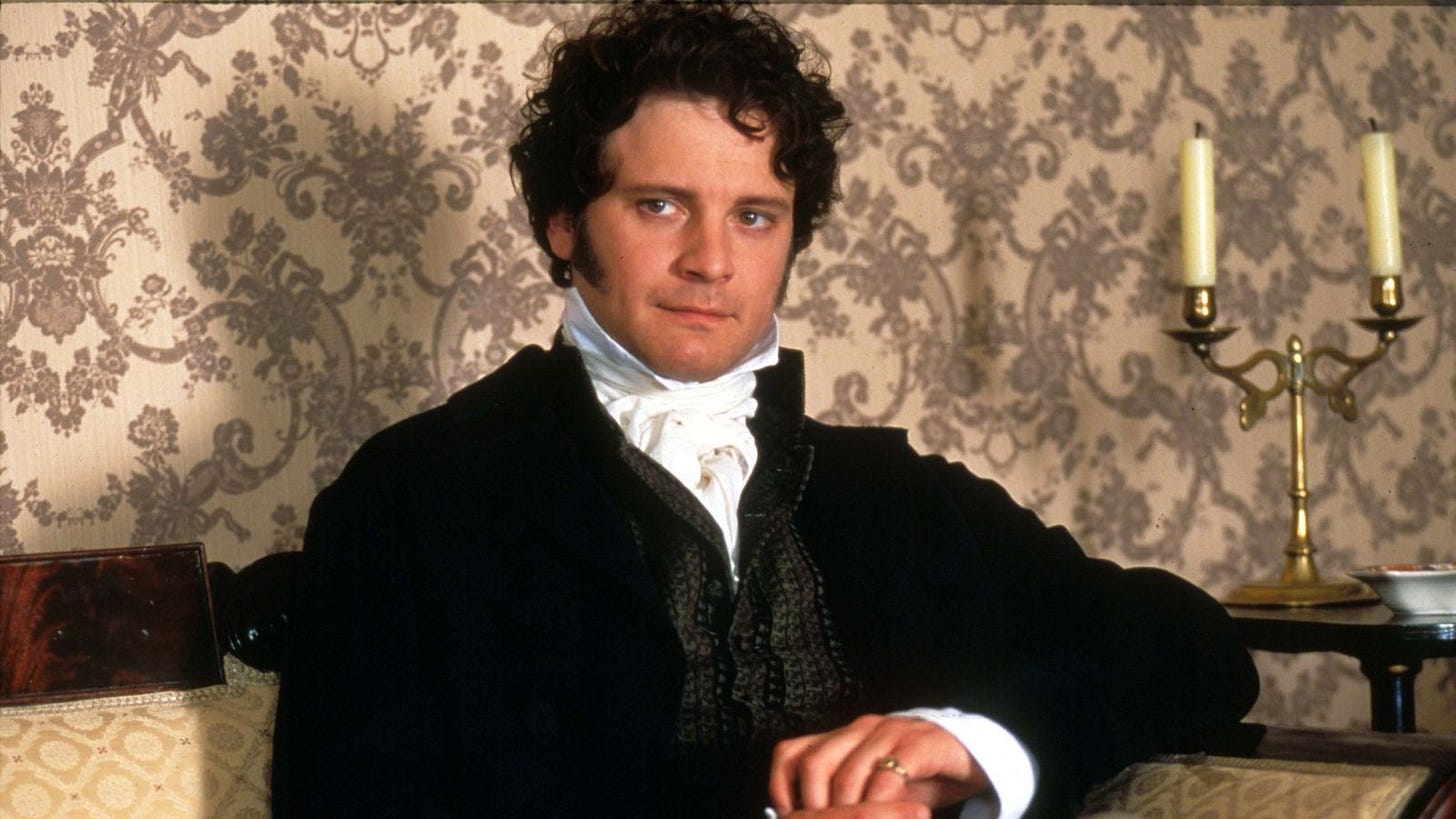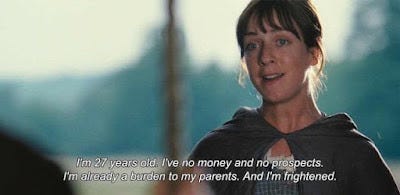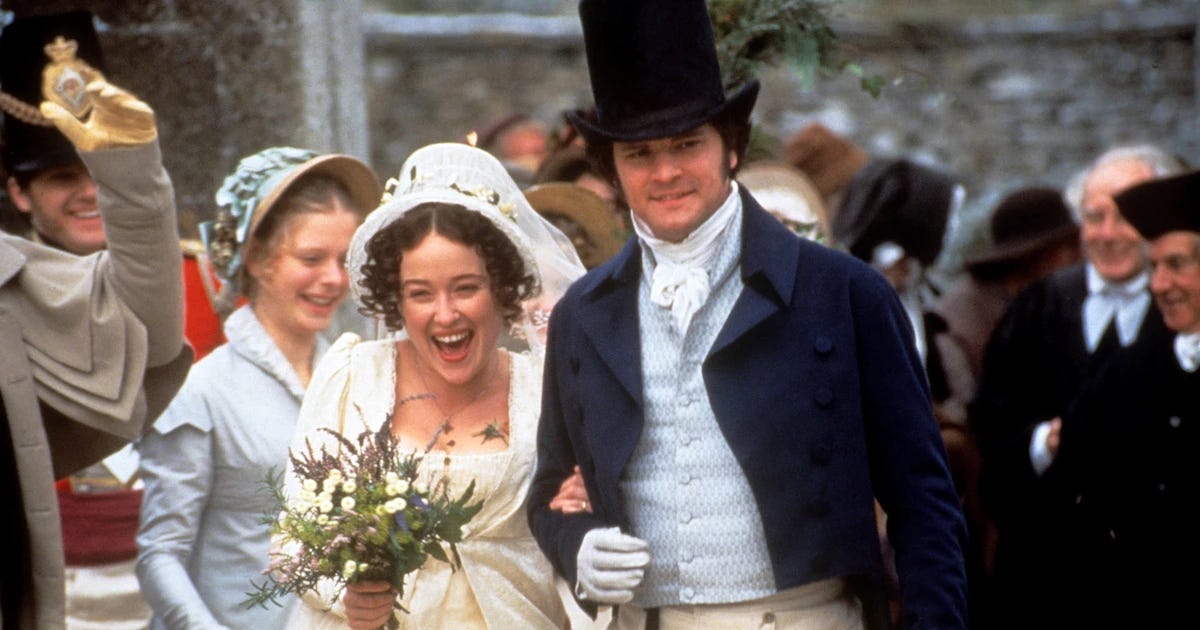Pride and Prejudice and Job-Hunting
It is a truth universally acknowledged that a successful company in possession of a sound budget must be in want of a new hire.
Ok, yes - this post goes beyond project management and applies to pretty much anyone looking for a job. It is also a result of my slight obsession with Jane Austen’s Pride and Prejudice. My newsletter, my rules 🙂.
Let’s get into it: I will compare the search for a husband in Pride and Prejudice with modern-day job-hunting. As usual, some forewarning:
You should be slightly familiar with Pride and Prejudice to enjoy this text. Pick any of the following:
Read the book. It's romantic, fun, and masterfully ironic. It may not be light summer reading, as the prose might be denser than what we're used to, and it's packed with Regency-era language conventions and social nuances.
Watch the 1995 miniseries. It is a masterpiece, a downright excellent adaptation, and the very origin of Colin Firth/Mr. Darcy super sexy legend. The famous lake + wet shirt scene comes from this show (not from the books). Also, Jennifer Ehle is amazing in everything she does. Period.
Watch the 2005 movie, the one with Keira Knightley. There’s some controversy in the Austen community, as some think this movie is overly romantic and slaughters the book. I don’t care. It is an overwhelmingly beautiful movie where every frame could be a painting. Yes, it takes liberties. No, they are not offensive. And If you need to portray Jane Bennet as the beauty of the county, there’s no better way to do it than by casting Rosamund Pike. Double points for also casting Carey Mulligan.
If you were born female in Regency England, and you were part of the gentry, your options for the future were:
To find a husband, preferably rich and agreeable.
To remain single and live out of your personal fortune if you were lucky enough to have one, which wasn’t very frequent for women back then.
To work, most probably as a governess, losing your gentry status (this was kind of a drama, so don’t take it lightly)
So let’s say that #1 (to find a husband) is the option that resembles our modern-day job-hunting as a way to secure one’s future well-being. Please don’t get me wrong; I am perfectly aware of how fucked up the situation was. While in Jane Austen's novels, the heroine typically finds love and financial stability, it doesn’t escape the reader that women are usually pretty much screwed most of the time.
Connections and networking
In Pride and Prejudice, connections are everything. Being well-connected means having family and friends comfortably established within the gentry. The Bennet sisters are not exceedingly well connected (especially on their mother’s side), so they must rely on their charm and accomplishments to create opportunities for marriage.
Similarly, modern-day job hunters rely on their network. We are all very aware of the importance of referrals and recommendations. LinkedIn is booming, everyone wants to connect, and coaches recommend job-seekers spend 75% of their time networking and 25% of their time applying. It is not impossible (I know this very well) to find a job without the help of a referral/recommendation. Still, it is certainly more difficult as we must rely solely on your resume's effectiveness and interview skills.
Assumptions, miscommunication, and misunderstandings
Pride and Prejudice is filled with characters assuming (generally wrongly) what other characters think, leading to misunderstandings and miscommunication. Is Jane Bennet indifferent? Is Darcy proud? Is Wickham honorable?
We tend to make assumptions during our job hunt due to the uncertainty of the entire process. Did the interview go well? What did the hiring manager mean with that comment or that look? Is the recruiter ghosting me because they are busy or because I didn’t make the cut? In Pride and Prejudice, the uncertainty generates good drama. In real life, it is exhausting!
Social conventions, best practices, and rules
In Pride and Prejudice (and in the Regency era in general), society followed a bunch of rules determining what was appropriate and what was not. Etiquette, courtship, dress code, social calls, etc, were highly regulated.
During job-hunting, we also follow many rules. My feeling, though, is that some of the rules are changing rapidly. Experts typically agree on specific rules when we write resumes or do interviews. Other rules seem more fluid, like the need for cover letters, how to cold-approach recruiters, or even the dress code for C-level position interviews. The good thing is that job hunters can attempt to apply common sense (while they still have some sanity left).
Let’s see now how marriage offers relate to job offers! We’ll go guy by guy.
Mr. Darcy - The prestigious and mega-successful big tech giant
Mr. Darcy represents a super high-profile job with many figures, a nice bonus, the opportunity to grow, and so on. The position is also, especially at the beginning, super intimidating. Applicants with impressive backgrounds and experience must be highly accomplished to apply. Lizzie Bennet represents the applicant that, without having previous experience at a big company (let’s say, without having outstanding connections), captivates the brain (the heart) of Mr. Darcy. The problem is that the first impression on Lizzie’s side is not encouraging, so here is where Mr. Darcy could use the interview process to captivate the applicant.
When we look for jobs, interviews should be a two-way street: the company assesses the applicant, and the applicant considers the company. In Pride and Prejudice, Lizzie mentions (maybe half joking, maybe not) that she started falling in love with Darcy when “first seeing his beautiful grounds at Pemberley.” During the Regency years, there was a close relationship between the estate's good management and the personality and morality of the owner. When Lizzie saw how well-managed Pemberley was and how appreciated Darcy was, she opened up to him. Similarly, a company showing the candidate they exercise good management (especially if current employees corroborate it) can go a long way to convince a candidate.
Mr. Bingley - The jackpot. The friendly and fun company
Mr. Bingley symbolizes the warm and supportive work environment with a salad bar, exceptional benefits, a more than reasonable salary, and taco Tuesdays. There are two things I’d like to highlight here:
When Bingley starts hinting at his interest in Jane, she and her family soon hope a marriage offer is imminent. When we search for jobs, and we get to move to the next round during the interview process, we also tend to hope and imagine ourselves working at that company. However, nothing is solidified until we get a job offer, like a marriage won’t happen without a formal proposal.
Bingley doesn’t propose to Jane (not at the beginning when the family hopes he would). There are many reasons, but one is that his acquaintances are worried about Jane’s real feelings. Does she love him? Well, she does, but she is shy, and maybe she has not expressed her inclinations openly (but decorously) enough, so she is coming out as indifferent. When job hunting, and especially when we have the opportunity to interview with possible future co-workers and managers, we shouldn't hide our interest in the opportunity. IMO, a thank-you letter after the interview noting that after the conversation we are even more interested in the opportunity can go a long way.
Mr. Collins - The so-so company, maybe a necessary evil
Mr. Collins is the job offer that barely checks any boxes. The project is unappealing, the benefits are mediocre, the industry is not what we want, and the salary will force us to move to a cheaper neighborhood. Lizzie rejects this offer at risk of becoming almost destitute if another offer doesn’t come soon. The Bennet household is not poor, but the moment Mr. Bennet dies, the estate goes to Mr. Collins, and the Bennet sisters will become almost destitute. Of course, Lizzie is our heroine, and she has to reject Mr. Collins so that we have tension and drama, and she ends up with perfect-for-her Mr. Darcy. IMO, rejecting Mr. Collins is undoubtedly a bold move, even reckless, depending on the situation. Charlotte Lucas is the one who accepts Mr. Collins. Honestly, I respect Charlotte. Sometimes we have to take a Mr. Collins. Sometimes a Mr. Collins is better than not being able to pay rent.
Wickham - The glamorous yet deceptive opportunity
Wickham symbolizes the job opportunity that appears glamorous and enticing on the surface but hides more red flags than someone placing Austen in the Victorian era. In Pride and Prejudice, Wickham is so bad that he is terrible at being bad. A simple survey of acquaintances could have quickly revealed his true nature, but Lydia is too silly to figure it out before it is too late. When job hunting, assessing the company's reputation, speaking with current or former employees, and considering long-term career implications before accepting an offer is essential. Again, as a two-way street, the interview process is vital for us to assess if the job will satisfy us. It is also true that sometimes we only see the red flags when we are already on the inside. Fortunately, we don’t live in the Regency era and can easily leave a job that deceived us.
Job hunting is super frustrating, I know! But you know what? We can always imagine we are Lizzie Bennet boldly and outspokenly exploring the world to score a fresh-out-of-the-lake Mr. Darcy. We must size up each option, think about our dreams and goals, and ensure the job vibes align with what we want. After all, Lizzie and Darcy are made for each other despite their initial pride and prejudice. Why wouldn’t we be able to find our Darcy-like fantastic job opportunity and pollute the shades of Pemberley together?




